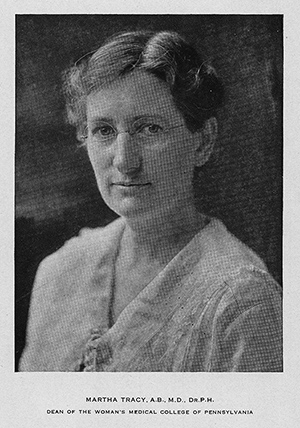As Dean of Woman's Medical College

Dr. Martha Tracy as Dean, 1918.
Martha Tracy’s professional career was marked by numerous high points and unique accomplishments. She continued this trend in 1917, when she assumed two major roles at Woman’s Medical College (WMC): first as faculty member and Professor of Hygiene, and second as Dean of the college. While her appointment as Professor of Hygiene meant that she gave up her primary passion for Chemistry, her assuming the role of 7thDean of WMC brought with it a great deal of prestige and power. She held the role of Dean from 1917 to 1940. As her good friend and colleague, Catherine McFarlane later wrote in eulogy to Tracy, “[h]er wisdom, her judgment, her serene poise qualified her to evaluate clearly, to decide wisely and to steer the one American medical college controlled by women along a safe and distinguished course.”
It was Martha Tracy’s dedication to WMC which allowed her to serve the institution through a number of financial and political crises which threatened to destroy it. Through the period of 1900 to 1920, WMC had survived a number of difficulties: WMC had lost its partnership with the Women’s Medical Hospital of Philadelphia, lost a number of cornerstone faculty retirement or death, and suffered a series of financial blows. Seven years before Tracy’s appointment as Dean, WMC was the only women-only medical college in the US; most others had either closed or become co-educational in an effort to stay afloat financially. Additional strain, which would resound for many years later, came from the release of a paper in 1910 by Abraham Flexner, entitled, Medical Education in the United States and Canada: a Report to the Carnegie Foundation for Advancement of Teaching. This seminal work, with its far reaching effects on medical education in the United States, would come to be known simply as The Flexner Report.
Why should The Flexner Report have such wide reaching impact on WMC?
Simply put, The Flexner Report advocated stricter standards and conduct for US Medical Schools. In response to the report, approximately half of the medical schools in the US were closed. Flexner’s specific criteria for a successful institution were: that instruction take place in a university environment, that the core of professors be full-time, and that there was research being conducted by the institution. Flexner was largely favorable in his review of WMC, citing that “there is striking evidence of a genuine effort to do the best possible with limited resources.” But, WMC could not hide the fact that it was not affiliated with a medical university, nor did WMC place a heavy emphasis on original research. Martha Tracy would do a great deal to make sure that WMC rose to these heightened standards, surviving the repercussions of The Flexner Report, and eventually thriving into the late 20th century.
Back to Top